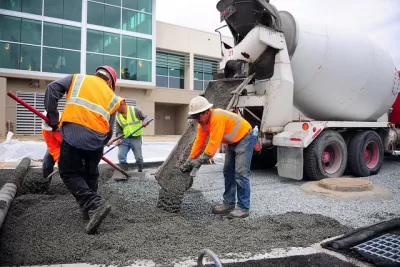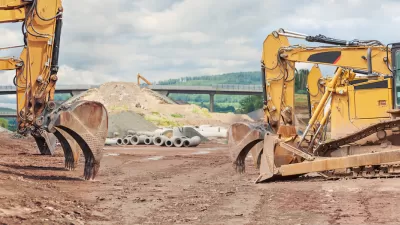Awarding federal funding via competitive grants could block grant opportunities for communities that need them the most.

As the Biden administration prepares to distribute billions in infrastructure funding to cities and states via competitive grants, some experts caution that many smaller and rural communities, lacking the institutional capacity to prepare slick grant applications and proposals, will be left out.
As Jake Blumgart writes, "Metro areas like Boston have a deep bench of experienced planners, a rich network of foundations and community development corporations, and organized business groups that push for transit and housing reform. But what about rural areas, deindustrialized Midwestern regions, or traditionally low tax and low service corners of the country like much of the American South?"
Most grants also require a 20 percent match, which may pose a challenge for poorer communities. "If federal agencies judge applicants by their capacity to draft and execute complex and resource-intensive projects, areas with smaller populations and smaller tax bases may suffer," says Blumgart. Federal funding available via competitive grants includes money for transit, brownfield remediation and climate resilience, electric vehicle infrastructure, and highway removal.
With smaller communities at a structural disadvantage, experts like Bruce Katz of Drexel University suggest the federal government could bolster capacity-building grants and improve access to grant-writing support for jurisdictions that would otherwise have a hard time catching the attention of federal officials.
FULL STORY: Smaller Cities, Poorer Regions Could Be Infrastructure Losers

Planetizen Federal Action Tracker
A weekly monitor of how Trump’s orders and actions are impacting planners and planning in America.

San Francisco's School District Spent $105M To Build Affordable Housing for Teachers — And That's Just the Beginning
SFUSD joins a growing list of school districts using their land holdings to address housing affordability challenges faced by their own employees.

The Tiny, Adorable $7,000 Car Turning Japan Onto EVs
The single seat Mibot charges from a regular plug as quickly as an iPad, and is about half the price of an average EV.

Seattle's Plan for Adopting Driverless Cars
Equity, safety, accessibility and affordability are front of mind as the city prepares for robotaxis and other autonomous vehicles.

As Trump Phases Out FEMA, Is It Time to Flee the Floodplains?
With less federal funding available for disaster relief efforts, the need to relocate at-risk communities is more urgent than ever.

With Protected Lanes, 460% More People Commute by Bike
For those needing more ammo, more data proving what we already knew is here.
Urban Design for Planners 1: Software Tools
This six-course series explores essential urban design concepts using open source software and equips planners with the tools they need to participate fully in the urban design process.
Planning for Universal Design
Learn the tools for implementing Universal Design in planning regulations.
Smith Gee Studio
City of Charlotte
City of Camden Redevelopment Agency
City of Astoria
Transportation Research & Education Center (TREC) at Portland State University
US High Speed Rail Association
City of Camden Redevelopment Agency
Municipality of Princeton (NJ)





























